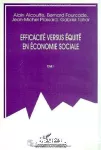 Accueil
Accueil
Détail de l'auteur
Auteur Alexandre Léné |
Documents disponibles écrits par cet auteur (45)


 Affiner la recherche
Affiner la recherche
document électronique
François-Xavier Devetter ; Placide Abasabanye ; Franck Bailly ; Amandine Barrois ; Karine Chapelle ; Annie Dussuet ; Oriane Lanseman ; Alexandre Léné ; Laura Nirello ; Emmanuelle Puissant | Paris : DARES | Rapport d'études | 2022Le Centre lillois d'études et de recherches sociologiques et économiques (Clersé) analyse le rôle que peut jouer l’organisation du travail sur les différentes relations qu’entretient le salarié. Hausse de l'intensité du travail, renforcement des[...]
Article : texte imprimé
L’apprentissage serait-il une voie de garage ? S’il a longtemps été vu ainsi, il attire aujourd’hui près de 500 000 jeunes français, du BEP-CAP à l’université. Une évolution qui a changé l’image de l’apprentissage, y compris parmi les classes pr[...]
texte imprimé
Florence Lefresne ; José Rose ; Matteo Sgarzi ; Arnaud Dupray ; Christophe Barret ; Thomas Couppié ; Dominique Epiphane ; Marie-Hélène Toutin ; Benoît Cart ; Alexandre Léné ; Horacy Debowsky | Marseille : Céreq | In and Around | 2020The theme chosen for this first issue - the School-to-Work Transition - has underpinned a large part of Céreq's scientific activities since its creation. The journal published several articles on this issue. In addition, it presents some interna[...]
Article : texte imprimé
Initial vocational training for young people in France is structured around two pathways: the school-based pathway, with training provided in vocational high schools, and the apprenticeship pathway, when young people enter into a dual vocational[...]
Article : document électronique
Desde principios de la década de 1990, el número de aprendices se ha duplicado y la población se ha diversificado, especialmente como resultado del avance de la educación superior. Las encuestas Generación permiten analizar 20 añ[...]
Article : document électronique
Our analysis is based on the French DARES Working Conditions survey which contains a very large sample of individuals representative of the French working population. We demonstrate that employees working in the cleaning sector report significan[...]
Article : texte imprimé
A l'aube de la réforme de la formation professionnelle, retour sur 20 ans d'insertion des apprentis
Depuis le début des années 1990, le nombre d’apprentis a doublé et la population s’est diversifiée, notamment sous l’effet de la percée du supérieur. Les enquêtes Génération permettent d’analyser 20 ans d’insertion des apprentis en tenant compte[...]
Article : document électronique
Purpose – The purpose of this paper is to estimate the effect of mobility on the apprentices’ wages. Design/methodology/approach – Using a French longitudinal survey concerned with young people’s entry into the labor market and their subsequent [...]
texte imprimé

texte imprimé

Article : document électronique
Notre article porte sur le contrat psychologique qui se noue entre l’apprenti et l’organisation qui l’accueille. Il s’agit d’une part, d’appréhender les attentes des apprentis vis-à -vis de leur employeur et les obligations qu’ils estiment avoir [...]
texte imprimé

texte imprimé

document électronique
Alexandre Léné | 2016Si les systèmes d’information et les technologies constituent un élément essentiel de ces différents systèmes de KM, la gestion des connaissances ne peut se réduire à la simple application d’outils. Nous défendrons l’idée d’un nécessaire alignem[...]
Article : texte imprimé

texte imprimé

texte imprimé

Article : document électronique
Nous analysons la mobilité des apprentis à la fin de leur contrat de formation. Le contrat d'apprentissage est en effet un contrat à durée déterminée particulier, à l'issue duquel l'apprenti peut être embauché ou non par l'entreprise où il a été[...]
document électronique
Marie-Hélène Toutin ; Benoît Cart, Collaborateur ; Ophélie Costenoble, Collaborateur ; Alexandre Léné, Collaborateur | Lille : CLERSE | 2014
texte imprimé
Christian Defélix, Auteur de la postface, du colophon, etc. ; François Stankiewicz, dir. ; Faïz Gallouj, dir. ; Izy Béhar, Préfacier, etc. ; Carine Deslée ; Alexandre Léné ; Camal Gallouj ; Faridah Djellal ; Sabine Pohl ; Pascale Desrumaux-Zagrodnicki ; Claire Bonnard ; Marc-Hubert Depret | Bruxelles : P.I.E. Peter Lang | Business & Innovation | 2014Concepteurs et gestionnaires créatifs de la fonction ressources humaines (RH), les managers RH peuvent, en interaction avec d’autres, jouer un rôle essentiel dans les innovations économiques. Notamment ils peuvent agir sur la production des idée[...]
Article : texte imprimé
The purpose of this paper is to analyse the consequences of the increasing prominence of soft skills, focusing specifically on the production of these skills and their recognition and recruitment. The paper shows that the demand for soft skills [...]
texte imprimé
L'économie des ressources humaines est une branche particulière des sciences économiques qui a pour objet d'analyser les pratiques du management des ressources humaines dans le but d'en augmenter l'efficacité, mais aussi d'en comprendre l'évolut[...]
texte imprimé
Florence Jany-Catrice, dir. ; Franck Bailly ; François-Xavier Devetter ; François Horn ; Alexandre Léné ; Thierry Ribault | Lille : USTL | 2010Ce rapport explore les contrastes infra-régionaux (en particulier entre la Seine Maritime et l'Eure, les deux départements de Haute-Normandie) en matière de développement des services à la personne. Les auteurs identifient des idéaux-type de dév[...]
Article : texte imprimé
Les périodes de la scolarité passées en entreprises occupent une place importante dans les dispositifs de formation professionnelle en France. Presque naturellement, une portée formatrice leur est attribuée. Cet article interroge ce lien mécaniq[...]
Article : texte imprimé

Article : texte imprimé

texte imprimé
Benoît Cart ; Alexandre Léné ; Journées d'étude sur les données longitudinales dans l'analyse du marché du travail (JDL n° XV; 22-23 mai 2008; Lille) | Marseille : Céreq | Relief | 2008Afin d'étudier l'adaptabilité des apprentis sur le marché du travail, les auteurs mesurent dans un premier temps leur mobilité à l'issue de la période de formation : restent-ils dans l'entreprise qui les a accueillis comme apprenti ou dans le do[...]
Article : texte imprimé
Didier Demazière ; Nicolas Postel, Éditeur scientifique ; Richard Sobel, Éditeur scientifique ; Alexandre Léné ; Bénédicte Martin ; François-Xavier Devetter ; Mohamed Madoui ; Patrick Mardellat ; Pascal Ughetto ; Gildas Loirand ; François Horn ; Nicolas Jullien |
Article : texte imprimé

Article : document électronique
Dans un contexte marqué par l'introduction massive des NTIC et d'importants changements organisationnels dans les entreprises, les études économiques soulignent l'importance accrue de l'investissement en capital humain et son rôle crucial dans l[...]
Article : document électronique
Paul Bélanger ; Danilo Martuccelli, Éditeur scientifique ; Jean-Jacques Paul ; Alexandre Léné, Éditeur scientifique ; Fatima Suleman ; Philippe Breton ; Alain Chaptal ; Bernardo Sorj ; Julie Remold ; Nicole Gadrey ; Pierre Doray |Ce dossier a pour sommaire:Présentation ;La production de connaissances dans la société de la connaissance : quel rôle pour le système éducatif ? La "société de la connaissance?? : généalogie d'une double réduction ; Le télé-enseignement : une [...]
Article : document électronique
L'explosion du thème de la société de la communication cache une série d'importantes lacunes analytiques, surtout en ce qui concerne son articulation avec les problèmes scolaires. C'est en partant de ce constat qu'a été conçu ce dossier, comme u[...]
texte imprimé
Christian Maroy ; Jean-François Giret ; Stéphanie Moullet ; Gwenaëlle Thomas ; Valérie Canals ; Claude Diebolt ; Magali Jaoul ; Fabienne Maillard ; Maurice Ourtau ; Geneviève Candau ; Bernard Conter ; Jean-François Orianne ; Catherine Gauvreau ; Jacques Amos ; François Rastoldo ; Alexandre Léné ; Cathy Perret ; Robert Gary-Bobo ; Alain Trannoy ; Olivier Giraud ; Julien Etienne ; Jake Murdoch | Marseille : Céreq | 2004Période couverte par le document : 1980-2000
texte imprimé
La forte progression du chômage des jeunes dans les années quatre-vingt a incité le gouvernement français à accorder une place de plus en plus grande, dans le système éducatif, à la formation en alternance. Jugée plus adaptée à l'acquisition de[...]
Article : texte imprimé
L'alternance serait un mode de formation particulièrement approprié pour former des professionnels adaptés aux exigences du monde productif. Néanmoins, l'alternance sous contrat de travail présente d'importants dysfonctionnements. Elle s'est maj[...]
Article : texte imprimé
L'évolution des savoirs mobilisés dans l'activité de travail ainsi que la complexification des tâches exigent une évolution constante des qualifications. La formation en alternance sous contrat de travail peut y répondre sous certaines condition[...]
Article : document électronique
Insitut d'économie publique (Marseille) ; Eric Verdier ; Centre régional associé de Dijon (Dijon) ; Martine Möbus ; Arnaud Dupray ; Stéphanie Moullet ; Didier Balsan ; Jean-Jacques Paul ; Jake Murdoch ; Julien Zankala ; Marcel Dagenais ; Claude Montmarquette ; Daniel Parent ; Nathalie Viennot-Briot ; Alexandre Léné ; Pierre Béret ; Saïd Hanchane |
texte imprimé
Gilles Margirier ; Alain Alcouffe, Éditeur scientifique ; Bernard Fourcade, Éditeur scientifique ; Christiane Alcouffe ; Maurice Baslé ; Jean-Michel Plassard, Éditeur scientifique ; Jacques Bichot ; Gabriel Tahar, Éditeur scientifique ; Alain Clément ; Christophe Ramaux ; Cyrille Ferraton ; Amos Witzum ; Christian Barrère ; François Lambert ; Hervé Defalvard ; Serge Latouche ; Viviane Tchernonog ; Monique Le Guen ; David Clément ; Catherine Sofer ; Jacques Prades ; Bruno Sire ; Michel Tremblay ; Liêm Hoang-Ngoc ; Jean-Claude Barbier ; Vincent Vandenberghe ; Marie-Denise Zachary ; Jean-Marie Monnier ; Denis Meuret ; Philippe Maitre ; Maryse Gadreau ; Daniel Goujon ; Gilles Caire ; Claire El Moudden ; Etienne Albiser ; Agnès Couffinhal ; Marie-Laure Fort ; Annie Jolivet ; Rachid Boumahdi ; Jean-Michel Lattes ; Hervé Jory ; Jacques Igalens ; Léa Lima ; Françoise Larré ; Gérard Barrère ; Sandoss Ben Abid ; François Orivel ; Morgane Le Doare ; Auguste M'piayi ; Chokri Abdennadher ; Mohamed Jellal ; Jordi Planas ; Eric Cahuzac ; Philippe Lemistre ; Maurice Ourtau ; Liliane Bonnal ; Sylvie Mendès ; Alexandre Léné ; Fabienne Berton ; Diane-Gabrielle Tremblay ; Pierre Doray ; Carol Landry ; Jean-Michel Espinasse ; Marie-Thérèse Rapiau ; Nelly Stephan ; Guillaume Biot-Paquerot ; Marie de Besses ; Philippe Mouy ; Franck Bailly ; Guy Maurau ; Isabelle Desbarats ; Thierry Cailleau ; Myriam Charlier ; Laurence Lizé ; Sonia Courbier ; Audrey Koulinsky ; Georges Menahem ; Jacqueline Martin ; Philippe Adair ; Bruno Jeandidier ; Anne Reinstalder ; Jean-Claude Ray ; Olivier Thevenon ; Laurence Assous ; Carole Bonnet ; Christel Colin ; Séverine Chapon ; Pierre Courtioux ; Marion Del Sol ; Pascale Turquet ; Jérôme Blanc ; Gérard Duthil ; Isabelle Adde ; Jean-François Raze ; Isabelle Guérin ; Gilles Raveaud ; Florence Audier ; Georges Buisson ; Somoudom Inthavong ; Philippe Mossé ; Philippe Hugon ; Abdelkrim Benarab ; Nacer-Eddine Hammouda ; Saib Musette mahmad ; Fethi El Bekri ; Fatma Zohra Oufriha ; Eric Rougier ; Yves-Antoine Flori ; Stéphane Tizio ; Anne-Marie Cretieneau ; S. Gado mohammed b. | Paris : L'Harmattan | Logiques économiques | 2000Les XXe journées de l'Association d'économie sociale (AES) organisées à Toulouse en septembre 2000 étaient consacrées à une réflexion sur les concepts d'efficacité et d'équité structurant les interrogations des sciences économiques depuis leurs [...]
texte imprimé
Gérard Podevin ; Bernard Gazier, Éditeur scientifique ; Jacques Defourny ; Jean-Luc Outin, Éditeur scientifique ; AES - ASSOCIATION D'ECONOMIE SOCIALE (1999; PARIS) ; Edith Archambault ; Florence Audier, Éditeur scientifique ; Geert Demuijnck ; Hervé Defalvard ; François Lambert ; Danièle Demoustier ; Liêm Hoang-Ngoc ; Thierry Jeantet ; Jean-Claude Barbier ; Coralie Perez ; Maïten Bel ; Annie Bouder ; Thierry Chevaillier ; Jean-Claude Eicher ; Laurent Cabotte ; Bruno Gilain ; Valérie Fargeon ; Monique Kerleau ; Pascale Turquet ; Marion Del Sol ; Clotilde Champeyrache ; Christophe Ramaux ; Paul Wallez ; Florence Chatelain ; Michel Lallement ; Gilbert Lefèvre ; Cécile Clergeau ; Maryse Gadreau ; Ariel Mendez ; Nadine Richez-Battesti ; Pierre Doray ; Carine Laliberte ; C. Landry ; Diane-Gabrielle Tremblay ; Vincent Vandenberghe ; Elisabeth Brun ; Anne Eydoux ; Mathieu Béraud ; Christine Daniel ; Carole Tuchszirer ; Alexandre Léné ; Jean-Louis Meyer ; Gérard Duthil ; Laurence Lizé ; Sophie Pochic ; Annie Chatenay ; Anne-Gaëlle Lefeuvre ; Séverine Lemière ; Rachel Silvera ; Muriel Maillefert ; Alain Clément ; Sarah Forest ; Agnès Checcaglini ; Jean-Paul Zoyem ; Héloïse Petit ; Philippe Abecassis ; Philippe Batifoulier ; Dominique Greiner ; Isabelle Hirtzlin ; Hervé Mauroy ; Isabelle Durand-Zaleski ; Dominique Costagliola ; Véronique Massari ; Françoise Le Pont ; Michel Setbon ; Alain Paraponaris ; Géraldine Tonnaire ; Jean-Paul Moatti ; Pascale Breuil-Genier ; Annie Dussuet ; France Huntzinger ; Anne Moysan-Louazel ; Isabelle Guérin ; David Vallat ; Vincent Dupriez ; Marie-Denise Zachary ; Yves Dutercq ; Bénédicte Gendron ; Morgane Le Doare ; Georges Solaux ; Guillaume Biot-Paquerot ; Sandrine Michel ; Marie-Thérèse Rapiau ; Nelly Stephan ; Yassine Annabi ; Thomas de Pariente ; Pierre Gravot ; Jean-Michel Plassard ; Faten Loukil ; Laurent Guilhery ; Volker Schmitt ; Guilhem Mestre ; Elisabeth Cozette ; Marie-Ève Joël ; Agnès Gramain ; Alain Colvez ; Arnaud Lechevalier ; Louis-Paul Pele ; Saïd Adjerad ; Jacques Charmes ; Chantal Bernard ; Abdelkrim Benarab ; Elsa Duret ; Benoit Massuyeau ; Naïma Pages | Paris : L'Harmattan | Logiques économiques | 1999Les XIXe journées de l'Association d'économie sociale ont été consacrées à une approche organisationnelle de l'économie sociale qui allie préoccupations théoriques et questions d'actualité. Du point de vue microéconomique, il s'agit d'examiner l[...]
texte imprimé
Gérard Podevin ; Bernard Gazier, Éditeur scientifique ; Jacques Defourny ; Jean-Luc Outin, Éditeur scientifique ; AES - ASSOCIATION D'ECONOMIE SOCIALE (1999; PARIS) ; Edith Archambault ; Florence Audier, Éditeur scientifique ; Geert Demuijnck ; Hervé Defalvard ; François Lambert ; Danièle Demoustier ; Liêm Hoang-Ngoc ; Thierry Jeantet ; Jean-Claude Barbier ; Coralie Perez ; Maïten Bel ; Annie Bouder ; Thierry Chevaillier ; Jean-Claude Eicher ; Laurent Cabotte ; Bruno Gilain ; Valérie Fargeon ; Monique Kerleau ; Pascale Turquet ; Marion Del Sol ; Clotilde Champeyrache ; Christophe Ramaux ; Paul Wallez ; Florence Chatelain ; Michel Lallement ; Gilbert Lefèvre ; Cécile Clergeau ; Maryse Gadreau ; Ariel Mendez ; Nadine Richez-Battesti ; Pierre Doray ; Carine Laliberte ; C. Landry ; Diane-Gabrielle Tremblay ; Vincent Vandenberghe ; Elisabeth Brun ; Anne Eydoux ; Mathieu Béraud ; Christine Daniel ; Carole Tuchszirer ; Alexandre Léné ; Jean-Louis Meyer ; Gérard Duthil ; Laurence Lizé ; Sophie Pochic ; Annie Chatenay ; Anne-Gaëlle Lefeuvre ; Séverine Lemière ; Rachel Silvera ; Muriel Maillefert ; Alain Clément ; Sarah Forest ; Agnès Checcaglini ; Jean-Paul Zoyem ; Héloïse Petit ; Philippe Abecassis ; Philippe Batifoulier ; Dominique Greiner ; Isabelle Hirtzlin ; Hervé Mauroy ; Isabelle Durand-Zaleski ; Dominique Costagliola ; Véronique Massari ; Françoise Le Pont ; Michel Setbon ; Alain Paraponaris ; Géraldine Tonnaire ; Jean-Paul Moatti ; Pascale Breuil-Genier ; Annie Dussuet ; France Huntzinger ; Anne Moysan-Louazel ; Isabelle Guérin ; David Vallat ; Vincent Dupriez ; Marie-Denise Zachary ; Yves Dutercq ; Bénédicte Gendron ; Morgane Le Doare ; Georges Solaux ; Guillaume Biot-Paquerot ; Sandrine Michel ; Marie-Thérèse Rapiau ; Nelly Stephan ; Yassine Annabi ; Thomas de Pariente ; Pierre Gravot ; Jean-Michel Plassard ; Faten Loukil ; Laurent Guilhery ; Volker Schmitt ; Guilhem Mestre ; Elisabeth Cozette ; Marie-Ève Joël ; Agnès Gramain ; Alain Colvez ; Arnaud Lechevalier ; Louis-Paul Pele ; Saïd Adjerad ; Jacques Charmes ; Chantal Bernard ; Abdelkrim Benarab ; Elsa Duret ; Benoit Massuyeau ; Naïma Pages | Paris : L'Harmattan | Logiques économiques | 1999Les XIXe journées de l'Association d'économie sociale ont été consacrées à une approche organisationnelle de l'économie sociale qui allie préoccupations théoriques et questions d'actualité. Du point de vue microéconomique, il s'agit d'examiner l[...]
texte imprimé
C'est la capacité des entreprises à assurer la formation des jeunes entrant sur le marché du travail qui est examinée dans cette thèse. Celle-ci s'attache à déterminer les conditions de fonctionnement des systèmes décentralisés de formation. Pou[...]
texte imprimé
François Stankiewicz, Éditeur scientifique ; Sophie Botte ; Christophe Debaisieux ; Sophie Legrand ; Benoît Cart ; Marie-Hélène Toutin ; Muriel Périsse ; Elodie Leignel ; Alexandre Léné | Paris : L'Harmattan | Dossiers Sciences Humaines et Sociales | 1998Cet ouvrage rend compte de travaux réalisés par de jeunes chercheurs de la région Nord-Pas-de-Calais dans le cadre d'un séminaire de recherche IFRESI-CNRS dont l'objet était d'analyser le rapport entre l'évolution du travail et la notion d'adapt[...]
texte imprimé
CNRS - Centre National de la Recherche Scientifique, Dédicataire ; IFRESI - INSTITUT FEDERATIF DE RECHERCHE SUR LES ECONOMIES ET LES SOCIETES INDUSTRIELLES.Lille (1997; LILLE) ; Patrice Grevet, Préfacier, etc. ; Monique Bélanger ; Sophie Botte ; Olivier de La villarmois ; Jean-Pierre Debourse ; Bénédicte Delneste ; Anne Dietrich ; Faridah Djellal ; Gérard Dokou ; Régis Dumoulin ; Alfred Gbaka ; Nicolas Glorieux ; François Horn ; Sophie Legrand ; Alexandre Léné ; Christian Mahieu ; Muriel Périsse ; Nicolas Postel ; Jean-Marie Scheer ; François Stankiewicz ; Hubert Tondeur | Lille : Institut Fédératif de Recherche sur les Economies et les Sociétés Industrielles (IFRESI) | 1997Cette deuxième journée de l'IFRESI (Institut fédératif de recherche sur les économies et les sociétés industrielles) s'inscrit dans le cadre d'un programme de recherche sur la transformation des activités, des villes et des territoires. Elle s'o[...]
texte imprimé
Nicole Gadrey ; IFRESI - INSTITUT FEDERATIF DE RECHERCHE SUR LES ECONOMIES ET LES SOCIETES INDUSTRIELLES.Lille (1995; LILLE) ; CONSEIL REGIONAL NORD-PAS-DE-CALAIS, Dédicataire ; Alain Desreumaux ; Pierre Louart ; Dominique Redor ; Gérard Kokou Dokou ; Gérard Gayot ; Roland Delacroix ; Olivier Dembinski ; Didier Demazière ; Francis Gugenheim ; Brigitte Monfroy ; Anne Bustreel ; Stéphanie Pryen ; Jean-Marie Beuscart ; Elisabeth Charlon ; Lise Demailly ; Fabrice Jacob ; Pascal Roquet ; Marie-Christine Vermelle ; J.-F. Inisan ; François Stankiewicz ; Sophie Legrand ; Martine Pernod-Lemattre ; Alexandre Léné ; Jean-Marie Scheer | Lille : Institut Fédératif de Recherche sur les Economies et les Sociétés Industrielles (IFRESI) | 1995








